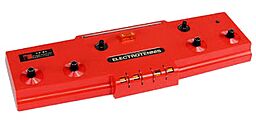TV Tennis Electrotennis facts for kids

A TV Tennis Electrotennis
|
|
| Also known as |
|
|---|---|
| Manufacturer | Epoch Co. (developed with Magnavox) |
| Type | Dedicated home video game console |
| Generation | First generation |
| Release date | Japan: September 12, 1975 |
| Introductory price | 19,000 Japanese yen |
| Units sold | Not clear; around 10,000, 20,000 or 3 million |
| Successor | TV Game System 10 |
The TV Tennis Electrotennis (which means Television Tennis in Japanese) was a special kind of home video game console. It was made by Epoch Co. in Japan. This console was released on September 12, 1975. It cost 19,000 Japanese yen, which was about $63 at the time.
This console was the very first video game console ever released in Japan. It came out a few months before the famous Home Pong console was released in North America. A cool thing about the TV Tennis Electrotennis was that it connected to your TV without wires! It used a special UHF antenna to send the game signal. It's not totally clear how many were sold, but estimates range from about 10,000 to 3 million units. About 5,000 units were sold in its first year.
What is a Dedicated Console?
The TV Tennis Electrotennis is called a "dedicated console." This means it was built to play only one game, or a very small number of games, that were already built into the system. You couldn't buy new game cartridges for it like you can with modern consoles. It was mainly for playing a simple tennis-like game.
Its Place in Video Game History
This console is part of the "first generation" of video games. This was when home video games were just starting out. Consoles from this time usually had very simple graphics, like dots and lines. They often played games like Pong, where you hit a ball back and forth.
What Came After
The next console from Epoch Co. was the TV Game System 10, released in 1977. This new console came with a toy light gun. It looked like a famous old pistol called a Mauser C96. You could also use this toy gun with Epoch's later console, the Epoch Cassette Vision, which came out in 1981.
The idea of a console connecting to a TV without wires was pretty advanced for its time. A designer at Nintendo, Masayuki Uemura, thought about adding this wireless feature to the Famicom (which was known as the Nintendo Entertainment System in other countries). However, he decided not to, to keep the Famicom affordable for everyone.
See also
 In Spanish: TV Tennis Electrotennis para niños
In Spanish: TV Tennis Electrotennis para niños
 | Madam C. J. Walker |
 | Janet Emerson Bashen |
 | Annie Turnbo Malone |
 | Maggie L. Walker |

